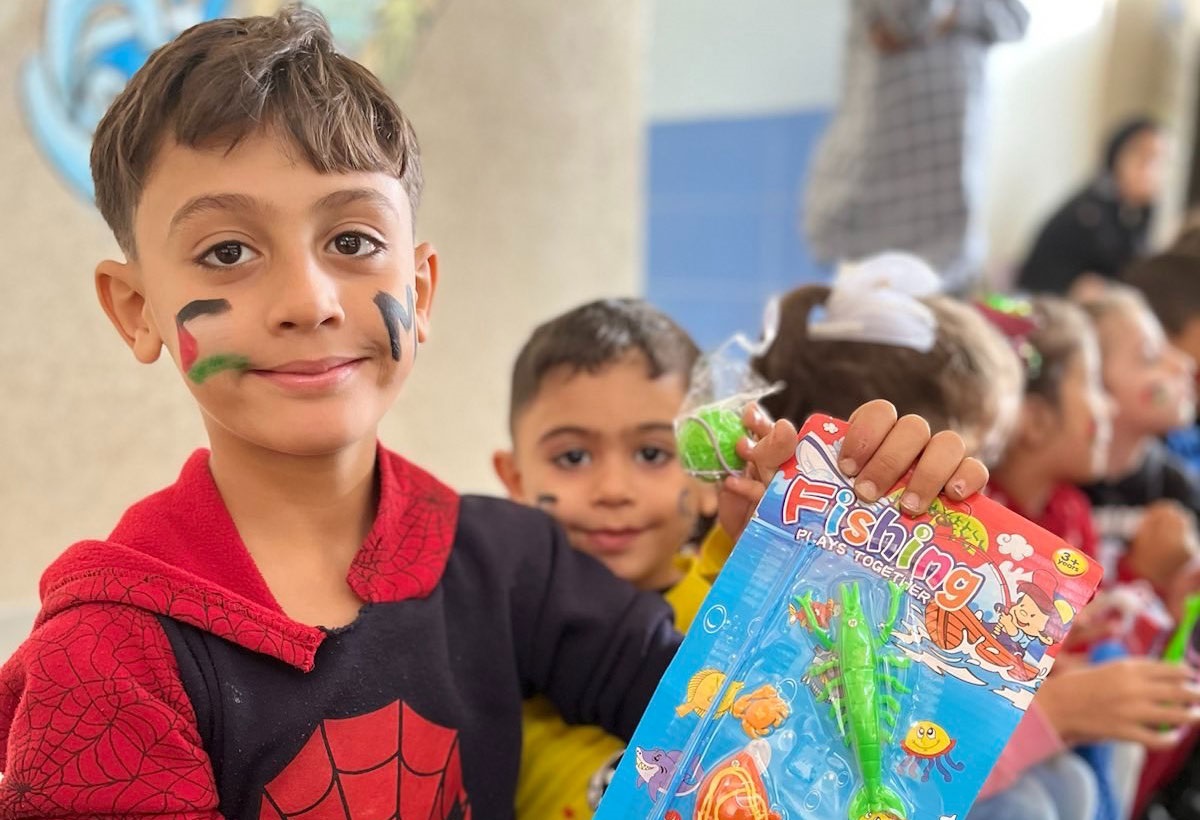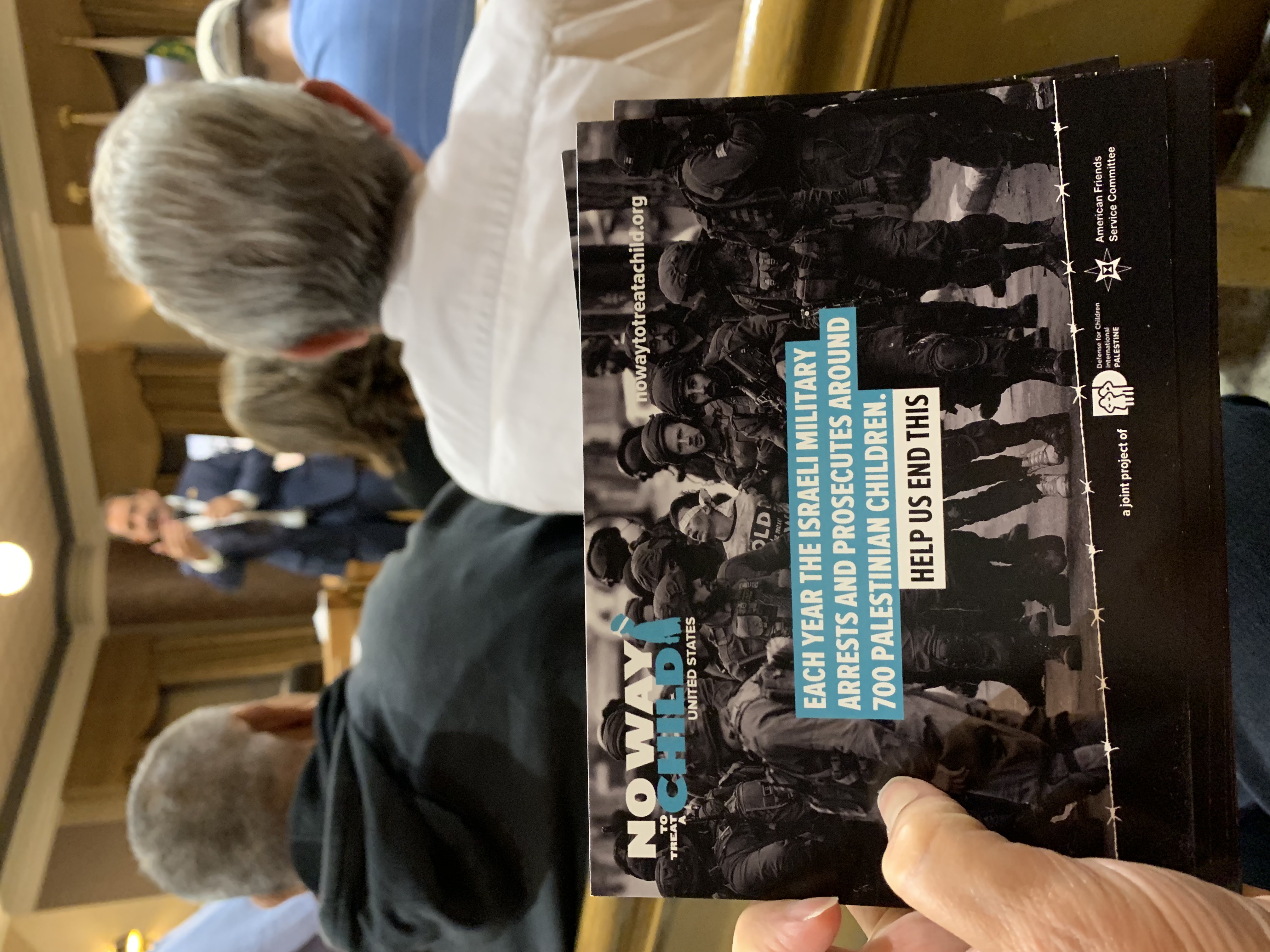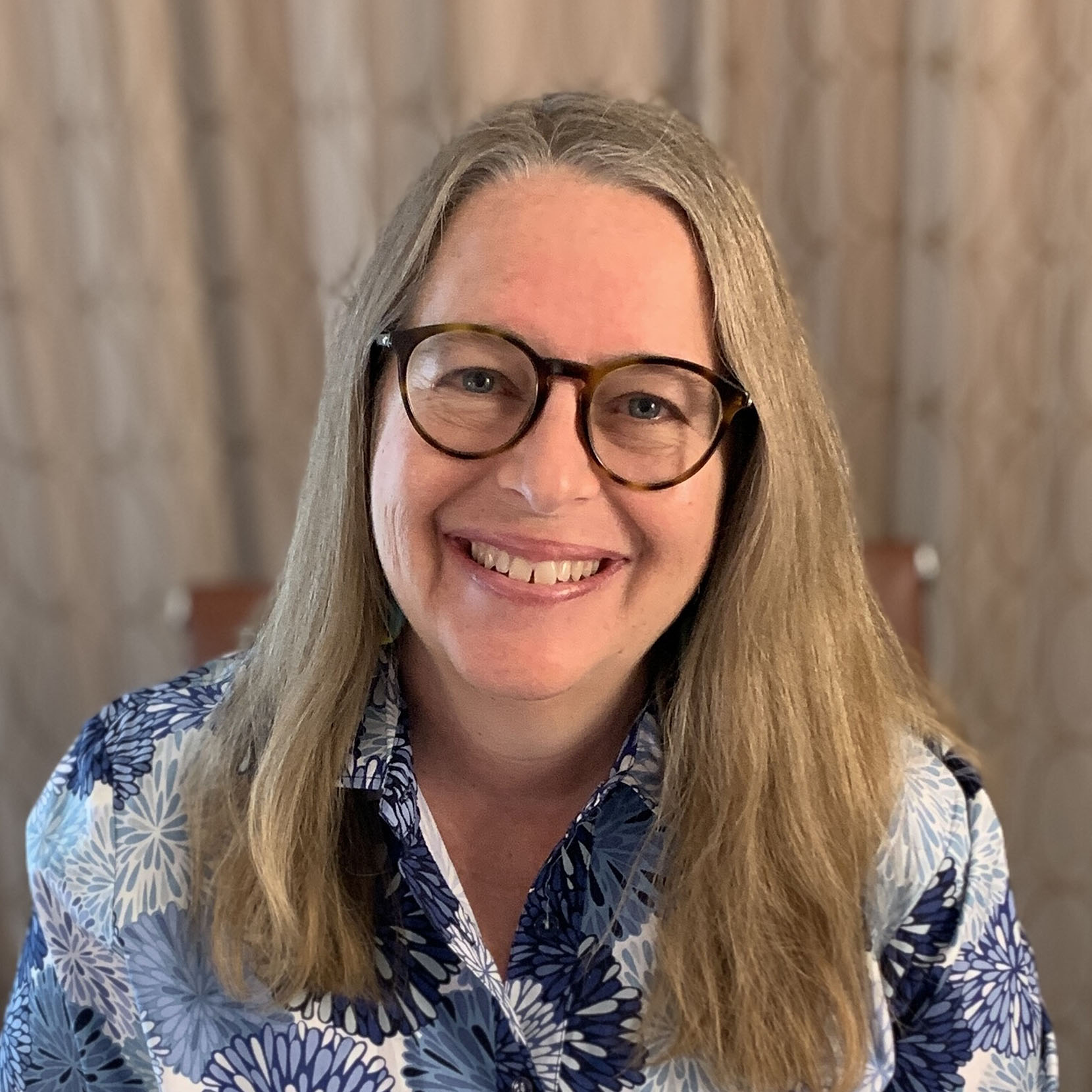
In Gaza, AFSC and partners help organize a day of activities in a shelter during the temporary cease-fire. Photo: Mayar Ramlawi
For the past eight years, AFSC has joined with Defense for Children International-Palestine and people across the U.S., North America, and other parts of the globe in the campaign “Israeli Military Detention: No Way to Treat a Child.” Our campaign has helped expose the cruel and systematic practice of Israeli authorities arresting Palestinian children and putting them in military detention. We seek to educate and advocate for the just treatment of Palestinian children living under Israeli occupation.
Early on in our campaign, we created compelling videos and graphics to help tell the story of the over 13,000 Palestinian children who have been detained by a military system that denies them their basic rights.
Palestinian children are often arrested in night raids on their homes—blindfolded and hand-tied, denied access to lawyers and their parents during interrogation, and coerced into signing confessions. They are convicted in military courts and imprisoned in detention centers, often inside Israel outside of the occupied West Bank, which makes it difficult for families to visit.
Our partners also documented and exposed the practices of holding Palestinian children in solitary confinement and administrative detention (held without charge or trial), which has increased in recent years.
Our campaign brought these difficult stories to the attention of faith communities, to human rights activists, and to elected officials. We helped create multiple legislative bills like the one currently in Congress, H.R. 3103, “Defending the Rights of Palestinian Children and Families Living Under Israeli Occupation Act.” The bill would prohibit Israeli authorities from using U.S. taxpayer funds to detain and torture Palestinian children, demolish and seize Palestinian homes, and further annex Palestinian land in the occupied West Bank.
But today, in the face of the current crisis in Gaza, we are compelled to expand our advocacy.
As I packed my bag in October to go to Washington, D.C. to meet with congressional offices, digging out my “meet members of Congress” attire, our No Way to Treat a Child campaign button was firmly attached to my suit jacket. Seeing the button made me weep.
The logo of our campaign depicts an image of a child with their eyes blindfolded and hands tied. It often provoked a strong reaction when I wore it -- often a compassionate one, as most people would agree this sort of treatment of children is wrong.

A town hall on the No Way to Treat a Child campaign. Photo: Jennifer Bing/AFSC
What image should be on my button now that Palestinian children are being slaughtered, I thought.
Our partners at DCIP wrote in their year-end summary for 2023, “This year has no comparison in the history of Israeli forces’ efforts to exert total control over the Palestinian people and violate children’s rights. Throughout the occupied Palestinian territory, including the Gaza Strip and the West Bank, including East Jerusalem, Israeli forces killed Palestinian children at an unfathomable, unprecedented rate.”
In early October, as I watched the number of Palestinian children killed and injured in Gaza soar – with horrifying images of lifeless small bodies being rushed to overcrowded hospitals, mothers crying out for humanity to stop the bombing, and entire neighborhoods being reduced to rubble by U.S. supplied bombs – I realized that all advocacy for Palestinian children must be directed to demand a permanent cease-fire in Gaza.
As of this writing, over 7,800 Palestinian children in Gaza have been killed, with thousands more missing under the rubble. UNICEF said Gaza was a “graveyard for children and a living hell for everyone else.” It has only gotten worse as the bombing and fighting have continued.
James Elder, UNICEF spokesperson, wrote after his visit to Gaza in November, “Nothing could prepare me for my recently concluded mission into the Gaza Strip, where children face catastrophic conditions. In my twenty years with UNICEF, traveling from one humanitarian crisis to the next – from famines to floods and war zones to refugee camps – I’ve simply never seen such devastation and despair as is happening in Gaza.”
Meanwhile, in the West Bank, Israeli army raids and detention of Palestinians (including 200 children) escalated this fall. 130 Palestinian child prisoners were released by Israeli forces as part of a truce agreement with Hamas in November, including 17 children in administrative detention. But the arrests since then have continued.
The number of Palestinian children killed in the West Bank is the highest recorded in decades. By mid-December, DCIP documents 114 children were killed by the Israeli army, 74 since Oct. 7.
So where do we go from here?
We are seeing people in the U.S. and around the world taking to the streets to show solidarity with Palestinians and a permanent cease-fire for Gaza. Powerful actions such as vigils, demonstrations, and acts of civil disobedience are continuing every day. During AFSC’s weekly online action hours, we have seen hundreds of people making calls to Congress and planning actions in their communities.
Today, popular opinion polls show that a majority of Americans – especially those under 45 years old (63%) and Democratic voters (76%) – support a permanent cease-fire and de-escalation of violence in Gaza. But although our efforts to push congressional support for a cease-fire has steadily increased, less than 12% of the total members of Congress (62, as of Dec. 17) have made a public statement supporting a permanent cease-fire.
The response from most U.S. elected officials is appalling, and it is unconscionable that despite the will of their constituents, so many have refused to help end these attacks. But I also know that now, more than ever, we cannot back down in our advocacy to protect the lives and rights of Palestinian children under occupation.
When we started our No Way to Treat a Child campaign, we believed that a movement of organized, educated advocates could make a difference. As we look to 2024, we remain committed to that vision. Protection not Detention. Freedom not Imprisonment. Life not genocide. Compassion not Despair.
